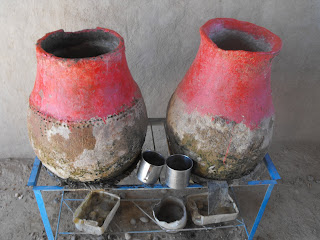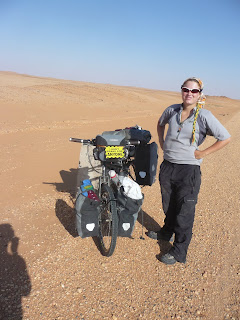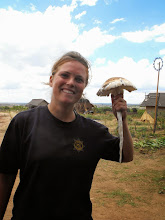
As we disembarked the boat entering Sudan, we cycled straight past the first and only town for the next 180km! Wadi Halfa was a very small town where we stopped to collect our water storage for the next few days. There were already some obvious comforting changes

We bought fruit at honest prices, no bartaring
- We ate lunch in peace, people who came up to you wanted to shake your hand rather than shout in your face!!
- As we got the bikes ready the locals exaggerated the need for water making us drink numerous full cups of water
Sudan has been a breath of fresh air after Egypt. The heat has been a challenge but the sceneries and quiet peaceful camping spots have been a dream. There are hardly any animals that can live and survive in the Sahara Desert. You can hear the harmless dung beetle swivle in the sand when you drop off to sleep under the blanket of clear night African stars. You can sleep and rest well until the sun rises and you are set for another day.


I completed my first 1000km as I cycled into the remote desert. The tarmacked road from Wadi Halfa to Khartoum was completed last year so was a dream to cycle on. There are storm drains which are perfectly designed for cyclists breaks - the only shade we could find!

The mountains in the distance compete with the neverending horizon of layered sand.

The highest temperature we calculated was midday - 48 degrees celcius / 21 percent humidity. I must curse the strict islamic country, Sudan for making me cover up while cycling in the veracious heat. I really do hope they appreciate my level of respect wearing trousers and a t shirt to cycle the Desert. The night temperatures do drop to a scorching 25 degrees celcius! This is winter; do not cycle in Sudan in the summer.

Thank god for the wind - I do not thank god for the flies! The strong prevailing southerly wind has pushed me up slopes and along at speed making things more exciting in the heat! When the wind is coming from the side you are also very grateful; the natural ventilation tackled my sweat and made it dissappear into salt molecule stains on my t-shirt.

It was spectacular to once again come across the Nile feeding dotted villages and trees after 2 days of cycling. It is an outstanding sight to come across a river 3 times the size of the Thames in one of the most arid dry places in the world.

Eid Celebrations
Eid is Islamic Christmas. All families join together for four days for the religious ritual, to eat. They kill 1 lamb or 4 if you have a big family and the resources! People have been overly generous, we were continually invited to join family meals or for tea on the road or once we stopped in Dongola.

Steves irriplacible Rohloff Hub snapped which was turmoil considering we were cycling another 10000km to Cape Town (and Steve another 4 continents!) let alone the 80km stretch to the nearest town with a broken spoke. Dongola is the next relatively big town inbetween Wadi Halfa and Khartoum so we were very lucky to be so close. In Dongola we met a lovely Korean family who took us under their wing.

Eid holiday was forever continuing . The four days celebrations was extended with another 3 day weekend. We were stuck in Dongola for 5 days waiting for the shops to open and for the restock of supplies delivered by donkey from the main cities. This turned out to be a blessing as I learnt a lot about the culture and communities and got to go swimming in the Nile!
During Eid it is common for people to get married as the family are all in one place. We saw two islamic weddings in one night! The ladies and gentlemen are separated at each side until the bride and groom arrive. The newly weds attract all spectaters to the dance floor in a big huddle and they rise and click their hand and hip to the rythem of the live music. Anyone in the town can turn up; this is freedom, a chance to attract the opposite sex. The second wedding / party ended in fights as the sexual tension rose and the teenagers gathered.

At 5 or 6 o clock in the evening as the temperature drops and the light lingers the town of Dongola becomes active. Families and ourselves joined for (the english tradition) tea and biscuits before dinner. I will have vivid memories of walking with the Korean family every evening to different welcoming doors. The kids laughed as I exaggerated my steps in the sandy dusty streets littered with holes and rubbish and I heard the echos of islamic prayer as I thought about the undeveloped and satisfied communities of Dongola.

A Historic Event
In Dongola, there are communities of misplaced families that fled from South Sudan during the Civil War (1983 - 2005). Buses were filled with people, belongings; families packed to finally return to their home country. This is an historic event taking place in preparation for the referendem on January 9 to decide whether South Sudan splitts off from the rest of Sudan as an independent country.
Despite the poor infrastructure and development the views I have heard from a traveller that came up from the South is that they are all wanting independence. The North would like to stay as one country to share the profits of the Southern oil reserves. Unfortunately the islamic North government officials have threatened the South saying if the countries are separated there will be war.
The Final Stretch
Steve had his bike welded with aluminium as a temporary solution for the final stretch from Dongola to Khartoum. There were villages with food and water at regular 50km intervals.

People congregate at the water points in the town. The shaded areas have clay pots that are filled with water regularly and left to settle. The dirt then sits at the bottom and the water is clean and available to drink. We have had to guess which water pot is the one you are supposed to drink out of. This could be just one of the thousand reasons why we both have been suffering with upset tummies. My favourite unanswered question at the international campsite this week has been - why do people not know to use bleach to clean the toilets?

Although there were more people dead livestock reiterated the harsh conditions of the desert.

There were many camal shepherds, groups or individuals on their own journey across the desert. They walk all the way to Egypt to exchange the camals for money and goods. It is very hard to photograph the hundreds of camals, they blend in with the sand. If you look closely though I did manage to photograph a bird of prey of which there are also hundreds across Sudan.
Steve and I established a great routine as we pedaled closer to Khartoum. Rising with the light we put the gas on to make porridge while packing everything so breakfast coincided with a fully loaded bike ready for take off. As I placed my biker sunglasses on my face and sung the ski sunday theme tune I took off with the wind making great time and slaloms to dodge the always expected bulk mass waste.
I will miss the peace and quiet of Sudan. Many people have spoken about the faces of Ethiopia poking up from every direction wherever you are; not to forget the kids stone throwing games. I have heard you cannot blog in Ethiopia so if this is the case my next update will be from Kenya. I am looking forward to the rain in Ethiopia. Sudan has had 10 minutes of rain this year!!
It is time for the next country; a change, another adventure to keep me on my toes. After so many thoughts as to why I am here I have figured out that it is the unexpected makes me feel alive.










































